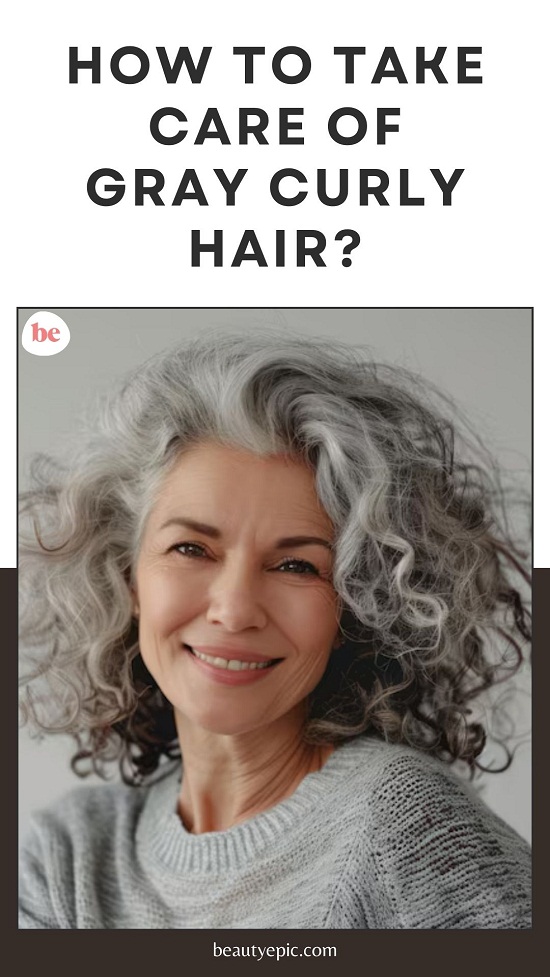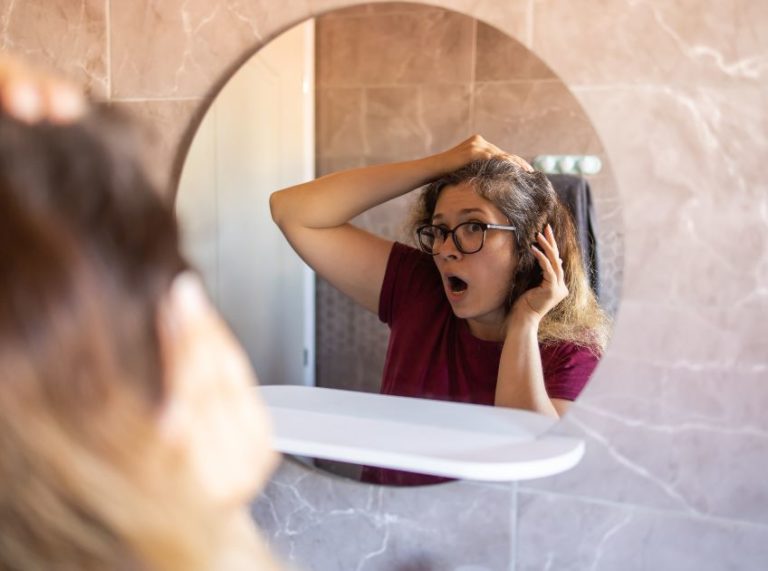
Important: This article is for informational purposes only. Please read our full disclaimer for more details.
Caring for gray curly hair is no small feat—it’s a delicate balance of science and self-care. As we age, our hair changes, becoming drier, coarser, and more prone to frizz. Add curly texture to the mix, and the challenge multiplies. But don’t worry—taking care of gray curls doesn’t need to be a mystery. Here’s your go-to guide to keeping your curls hydrated, healthy, and looking their best.
1. Understanding Gray Hair
You’ve probably noticed that your hair isn’t quite the same as it used to be. As we age, our bodies slow down on producing melanin, the pigment responsible for color. But it’s not just about the color change—gray hair brings along its own set of quirks.
- Loss of Sebum: One of the first things you’ll notice is that your scalp doesn’t produce as much natural oil (sebum) anymore. That means your hair gets drier, and trust me, you’ll feel it. Gray hair can also feel more coarse and brittle, so keeping it nourished is a must.
- Increased Porosity: Gray hair tends to be more porous, which sounds like a technical term, but all it really means is that your hair can absorb moisture quickly—only to lose it just as fast. Keeping that moisture locked in is key!
2. Moisturizing Your Hair
Hydration is your best friend here, and you want to make sure you’re giving your curls what they need without weighing them down.
Hydrating Products
- Sulfate-Free Shampoos: Skip the sulfates. They can strip your hair of natural oils, which is the last thing you want for dry, curly gray hair. Look for shampoos that include hydrating ingredients like glycerin or aloe vera. Natural oils such as coconut or argan oil can also help boost moisture.
- Deep Conditioning Treatments: Don’t be afraid to deep condition—your curls will thank you. A good hair mask with shea butter or avocado oil can make all the difference in restoring hydration and keeping those curls elastic.
Natural Methods
- Coconut Oil: Ah, coconut oil—an age-old remedy for many hair woes. If your hair feels extra dry, give coconut oil a try. It can penetrate deep into the hair shaft and provide some much-needed moisture. Just remember, it works wonders for some but might leave others with greasy buildup, so test it out first!
- Aloe Vera Gel: This might sound simple, but aloe vera is packed with vitamins and minerals that help nourish both your scalp and hair. Its hydrating properties can reduce frizz and leave your curls looking bouncy and fresh.
3. Washing Techniques
How you wash your hair matters just as much as what products you use. It’s all about being gentle and taking your time.
Gentle Cleansing
- Lukewarm Water: You might think hot water feels good on a cold day, but it’s not the best for your hair. Stick to lukewarm water to cleanse without stripping away your hair’s natural moisture.
- Limit Washing Frequency: Curly hair doesn’t need to be washed every day. In fact, over-washing can lead to dryness. Try washing 2-3 times a week to keep your curls hydrated and healthy.
Natural Methods
- Apple Cider Vinegar Rinse: Ever heard of apple cider vinegar for hair? It’s not just a kitchen staple—it’s great for your scalp. A simple rinse after shampooing helps balance your scalp’s pH and removes buildup without drying out your curls.
4. Detangling Techniques
Detangling can be a bit of a challenge, especially when you’ve got curly, gray hair. But don’t worry, with the right technique, it’s totally manageable.
Gentle Detangling
- Wide-Toothed Comb: A wide-toothed comb is your best friend when detangling curly hair. Always comb when your hair is wet and conditioned to minimize damage. Start at the ends and gently work your way up.
Natural Methods
- DIY Detangling Spray: Make your own detangling spray with water, a few drops of lavender or rosemary oil, and a leave-in conditioner. It’s a great way to add some moisture and make detangling a breeze.
5. Protecting Your Curls
If you want to keep your curls looking their best, you need to protect them from damage. Here’s how.
Heat-Free Styling
- Curl Creams and Mousses: There’s no need for heat styling tools when you’ve got natural curl enhancers. Look for curl creams or mousses that define curls without causing heat damage.
Natural Methods
- Flaxseed Gel: Flaxseed gel is one of my favorite natural styling products. It’s rich in omega-3 fatty acids, which nourish the hair, and it helps hold curls without that crunchy feeling. Plus, it’s super easy to make at home—just boil flaxseeds in water, strain, and voila!
6. Regular Trims
Trim your hair regularly—every 6-8 weeks. This not only keeps your curls looking fresh but also prevents split ends from making their way up the hair shaft.
7. Color Maintenance
If you’re coloring your gray curls, here’s what you need to know.
- Purple Shampoo: Gray hair, whether natural or colored, can sometimes pick up a brassy tone. A weekly purple shampoo can help keep your color bright and your curls looking sharp.
- Gentle Hair Colors: When coloring, opt for ammonia-free dyes. These are gentler on your curls and help maintain moisture during the process.
8. Embrace Your Natural Texture
Instead of trying to straighten or alter your curls, why not embrace them? Experiment with different styling techniques to define your natural curls and enhance your unique texture.
Conclusion
Caring for gray curly hair is all about understanding your hair’s unique needs—hydration, gentle cleansing, and moisture retention are at the heart of the process. With the right products and techniques, you can keep your curls healthy, vibrant, and full of life. Whether you prefer natural remedies or store-bought solutions, it’s all about finding what works best for you. So, embrace your natural beauty and enjoy your curly, gray locks!
















